Find The Location Nearest Covid-19 Testing
We think you’re located in zip code 80525. Not Right?
Fort Collins, CO School Sports Physicals Near Me
School sports are in full swing! Come visit AFC Urgent Care of Fort Collins to receive your annual sports physical today – walk-ins welcome.
$40 Sports Physicals for Students
Pre-Register Now
Discipline, perseverance and communication are just some of the skills you learn from playing a sport. Not only can sports help you maintain a healthy body and mind, but they help cultivate important life skills. While it’s exciting and maybe even a little nerve-wracking trying out for the team, before you do, you’ll have to undergo a sports physical. This isn’t a scary process, it’s actually very simple and AFC Fort Collins has outlined everything you need to know.
What is a Sports Physical?
A sports physical exam is also called a pre-participation physical examination (PPE). It assists in determining whether it is safe for you to participate in a certain sporting activity. Children and teens are required (in most states) to get a sports physical before they can start a new sport or prior to beginning a new season.
Do I Need to Bring Anything?
There are a few things you can prepare ahead of time, so your visit can go as smoothly as possible.
*Please note we can only verify immunizations administered at our clinic or with appropriate documentation showing vaccination history.
- Bring any required forms including a completed health and immunization history.
- If the patient has any previous history for any type of heart problem or heart condition, AFC Fort Collins requires documentation from the patient’s primary care or treating physician stating the condition does not prevent participation in sports.
What Will Happen During a Sports Physical?
There are two main portions of a sports physical: medical history and a physical exam.
Medical History
This half of the exam is oral. The provider will ask the patient questions concerning their medical history and their family’s health history. Be prepared to answer questions regarding:
- Family history of any serious illnesses
- Any current illness or previous illness when you were younger
- Earlier hospitalizations or surgeries
- Allergies to medication, food or insect bites
- Previous injuries
- Loss of consciousness, dizziness or fainting spells.
- Any chest pain or discomfort
- Difficulty breathing when working out or exercising
- Frequent headaches
- Heart problems (murmur or irregular heartbeat)
- Liver or kidney problems
- Any medicines that you regularly take. This includes both prescription and non-prescription medications, natural or herbal supplements.
- Mental health
We recommend that a parent or guardian sit-in during these inquiries because children or teens may not remember their medical history or be aware of their family’s history. In fact, most healthcare providers consider the medical history portion to be the most valuable part of the exam.
Physical Exam
After the medical history portion of the exam, the physician or health care provider will usually record, check and test the following:
- Height and weight
- Blood pressure and pulse
- Vision and hearing
- Heart, lungs, abdominal area, ears, nose and throat
- Possible hernias
- Muscle strength and flexibility, posture and joints
- Depending on the child’s age the provider may check cholesterol, hemoglobin count and perform a urinalysis.
The physical exam is almost identical for males and females; however, the provider may ask different questions depending on whether the athlete has started or completed puberty. Questions about the use of drugs, alcohol or dietary supplements are also common. Weight-loss supplements, steroids and/or other performance enhancers are topics that may be covered during the physical exam because these impact an individual’s health.
Why Is a Sports Physical Important?
A sports physical is all about safety. AFC health care providers are looking for conditions or injuries that might put the patient at risk when playing a sport. If an issue is found, the provider will make personalized recommendations for the future.
For example:
- An asthmatic athlete may need to have their inhaler dosage adjusted based on their new activity level.
- A provider might suggest specific stretches or strengthening exercises to prevent injury.
- Safety tips, like proper hydration and protective equipment, may be reviewed.
The health of children and teens can change from year to year, which is why a sports physical is one helpful way to stay on top of their health.
When Should I Get a Sports Physical?
AFC Fort Collins recommends completing your sports physical six to eight weeks before your season starts (once a year is all you need). That way, if the provider needs to treat a new condition, send a referral to a specialist or book a follow-up exam there will be plenty of time before the sports season begins.
What If There Is a Problem After the Exam?
After a clean bill of health, the provider will complete the physical exam form. However, occasionally they will request additional testing, a follow-up exam or suggest a treatment for any new medical issues discovered during the exam.
Providers could recommend modifications such as using special protective equipment, carrying epinephrine shots when playing outdoor sports or using an inhaler.
Many health concerns found during a sports physical do not usually prevent an athlete from participating in sports, they just may need a few extra measures in order to play.
Is your primary care doctor booked? Walk into AFC Fort Collins today for a fast and comprehensive sports physical.
 How Can We Help?
How Can We Help?
- PATIENT SERVICES
- COVID-19 SERVICES
- TELECARE
- EMPLOYER RESOURCES
- PATIENT RESOURCES
- ABOUT US
Don't wait to get the medical attention you need.
CALL US TODAY | (970) 672-4026